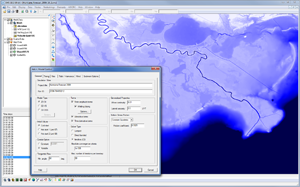We use cookies to make your experience better. To comply with the new e-Privacy directive, we need to ask for your consent to set the cookies. Learn more.
ADCIRC
Coastal Circulation Modeling with SMS

Application:Coastal Modeling
Method:2D Finite Element
Developer:ADCIRC Development Group
Why ADCIRC with SMS?
SMS provides a custom interface to the ADCIRC model offering a simple way to set model parameters and a graphical user interface to run the model and visualize the results. Gather background data from a variety of sources from GIS to CAD and access online data from numerous databases of maps, images, and elevation data. SMS allows you to interact with models in true 3D taking advantage of optimized OpenGL graphics and to create photo-realistic renderings and animations for PowerPoint, print, and web presentations.
Try SMS Free for 14 Days >Purchase SMS with ADCIRC >
ADCIRC Description:
The ADvanced CIRCulation model (ADCIRC) is a two-dimensional, depth-integrated, barotropic time-dependent long wave, hydrodynamic circulation model. ADCIRC models can be applied to computational domains encompassing the deep ocean, continental shelves, coastal seas, and small-scale estuarine systems. Typical ADCIRC applications include modeling tides and wind driven circulation, analysis of hurricane storm surge and flooding, dredging feasibility and material disposal studies, larval transport studies, near shore marine operations.
ADCIRC is a highly developed computer program for solving the equations of motion for a moving fluid on a rotating earth. These equations have been formulated using the traditional hydrostatic pressure and Boussinesq approximations and have been discretized in space using the finite element (FE) method and in time using the finite difference (FD) method.
ADCIRC boundary conditions include:
- specified elevation (harmonic tidal constituents or time series)
- specified normal flow (harmonic tidal constituents or time series)
- zero normal flow
- slip or no slip conditions for velocity
- external barrier overflow out of the domain
- internal barrier overflow between sections of the domain
- surface stress (wind and/or wave radiation stress)
- atmospheric pressure
- outward radiation of waves (Sommerfield condition)
ADCIRC can be forced with:
- elevation boundary conditions
- normal flow boundary conditions
- surface stress boundary conditions
- tidal potential
- earth load/self attraction tide
